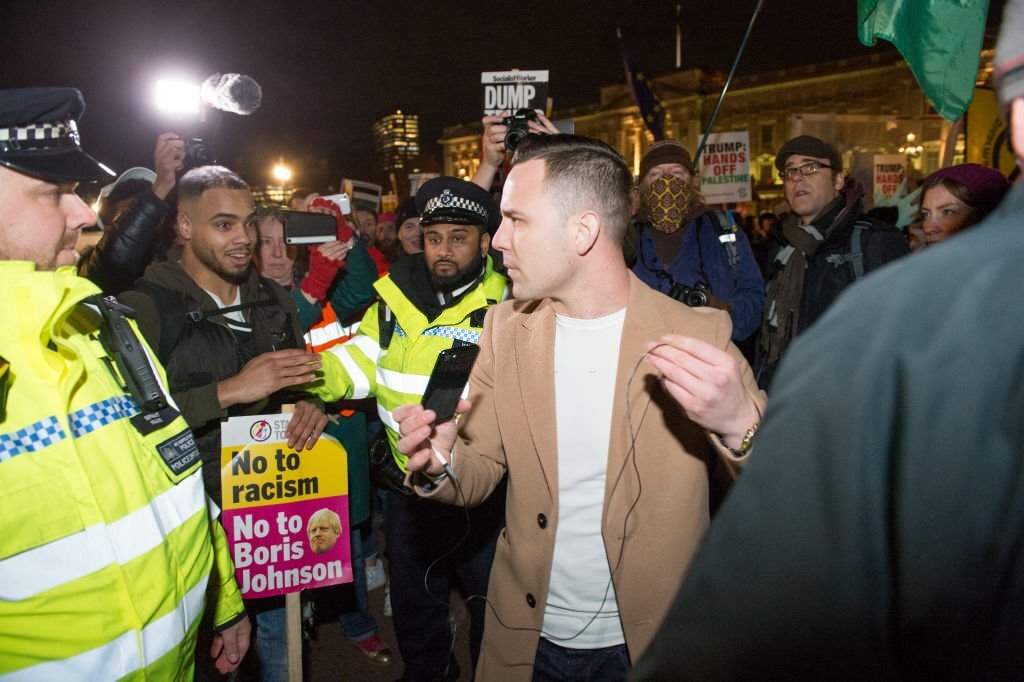The British far right is changing. In the 2010s, we saw significant populations of the far right led by “far-right influencers”. One of the prominent people in these groups was the English Defense League (EDL) leader, Tommy Robinson. Now, the right wing is trying to build a movement. Far-right groups avoid the “influencer plus audience” model that Tommy Robinson followed. They try to organise and recruit members with more staying power and stability. These new organisational forms combine online and offline activities and media with community-building activities. The growing British far-right movement is a threat to Britain’s security.
Tommy Robinson’s political background
As the guardian says, Tommy Robinson is the far-right founder of the English Defence League. His real name is Stephen Yaxley-Lennon. According to Parliament Magazine (02 May 2019), Tommy Robinson was to stand in the EU elections. He is a controversial anti-Islam activist. Local MP Mike Kane signed a joint letter with Christian, Jewish and Muslim faith leaders. They said, “Robinson’s far-right political views are not welcome in our town and our great city.” The letter reads: “Together, on behalf of our community, we felt it necessary to speak out against his visit. We firmly believe that violence and racism have no place in our political discourse.”
However, as Hope Not Hate says, a core team of people supports Stephen Lennon (aka Tommy Robinson). These people are loyal to him and him personally. Between them, they run his social media channels, help with research, produce his films and provide security. There are tensions and rivalries between them, but they are loyal to Tommy’s brand. The broader Lennon fan base calls them Team Tommy.
Tommy Robinson and racism
According to Parliament Magazine, on a campaign website, Robinson had planned to speak out against “the Islamification of Britain” if he became MEP for the northwest of England. Robinson founded the EDL, a far-right Islamophobic group, in 2009. He has often complained of being misrepresented.
Some say that he has made remarks in films, including “Somalis are backward barbarians”. He has called British Muslims “enemy combatants who want to kill you, maim you and destroy you”. He has claimed refugees are “raping their way through the country.”
Far-Right Party is a serious threat.
As Novara Media says, Britain’s Growing Far-Right Party Is a Serious Threat. Individual members openly describe themselves as fascists. The British far right is changing. The 2010s were defined by huge crowds directed by ‘far-right influencers’. The shameless provocateur and leader of the English Defence League (EDL), Tommy Robinson, was among them. Robinson’s influential abilities allowed him to crawl to the top of any far-right formation. Although he was an impressive audience-builder, he had no interest in building a membership organisation. The ‘far-right influencer’ model made Robinson personally notorious, and it kept the far-right’s aggressive Islamophobia in the public consciousness. Still, it didn’t produce highly structured or remarkably coherent far-right organisations.
The right is trying to build a movement.
As Novara Media says, Tommy Robinson leaves behind little in the way of formal structure for the far right. Other far-right groups have eschewed the ‘influencer-plus-audience’ model he perfected. They have instead attempted to build membership organisations with more staying power. These new organisational forms blend online and IRL activity and mediagenic stunts with the slower work of community building.
An active far-right party is the Patriotic Alternative party. It started in 2019. It has recently risen to prominence amongst the British far right. According to the Times, the far-right fight clubs train men to make Britain white. Experts fear extremists are forging a force primed for street violence.
As Novara Media says, street movements like the EDL and the Democratic Football Lads Alliance (DFLA) were ‘civic nationalists. They were nominally open to non-white members. However, the Patriotic Alternative party has embraced white supremacist ethnonationalism. Individual members openly describe themselves as fascists. It is now PA’s central task to thicken these in-person connections. It will do so not through the 2010s’ street movements’ large-scale demonstrations but through what it calls ‘community building’. This essentially means doing fitness training together, going camping, hiking and establishing a network of nationalist businesses.
Far-right’s online and offline activities
According to the Guardian: Facebook and Instagram banned Tommy Robinson. Facebook says it banned him for repeatedly breaking policies on hate speech. The company said Robinson broke rules that prohibit public calls for violence against people based on protected characteristics. He broke laws that ban supporting or appearing with organised hate groups. The decision to ban Robinson from social media sites could threaten his ability to reach large audiences. Twitter has also already banned him.
According to Hope Not Hate, as deplatforming has increased, far-right activists have moved across to alternative social media platforms. In recent years far-right activists and movements have faced an increasingly important problem. They are hugely dependent on internet platforms while not being in control of them. For most postwar, far-right activists were actively marginalised from mainstream discourse. Therefore, it became difficult for extremists to reach large audiences. For this reason, the far right were enthusiastic early adopters of the internet. They saw the internet as an opportunity to disseminate their ideas.
The threat of far-right movements is serious
Far-right movements and communities can lead to a severe threat to the security of Britain. Such actions and membership organisations of far-right parties can lead to the spread of fascism in the UK. Such far-right organisational forms can result in far-right terrorism. As Hope Not Hate says, the threat of far-right terrorism remains high in the UK. There were 18 far-right sympathisers convicted of terror-related offences in 2021, a 50% increase from the previous year. To sum up, the threat of far-right movements is serious. The broader left must start organising against them.

